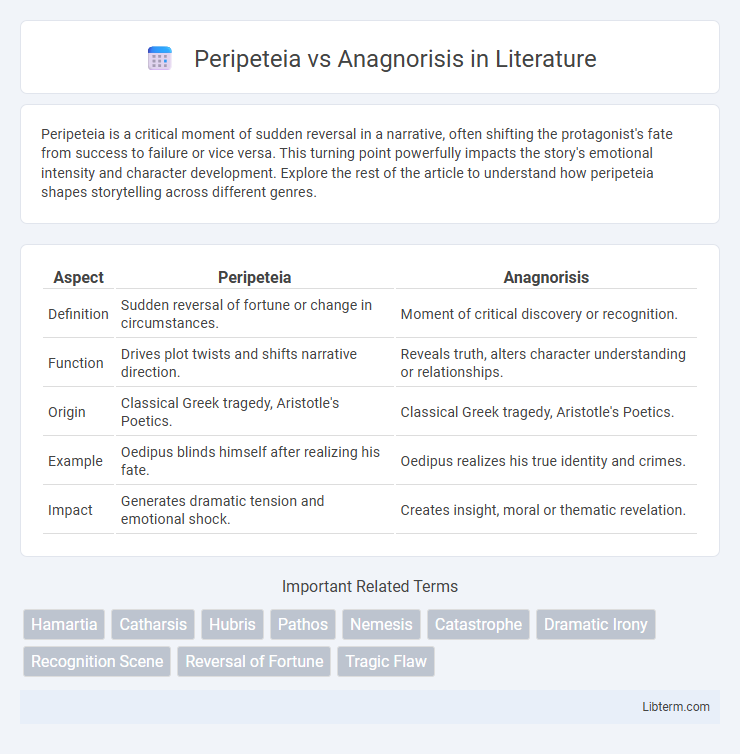Peripeteia is a critical moment of sudden reversal in a narrative, often shifting the protagonist's fate from success to failure or vice versa. This turning point powerfully impacts the story's emotional intensity and character development. Explore the rest of the article to understand how peripeteia shapes storytelling across different genres.
Table of Comparison
| Aspect | Peripeteia | Anagnorisis |
|---|---|---|
| Definition | Sudden reversal of fortune or change in circumstances. | Moment of critical discovery or recognition. |
| Function | Drives plot twists and shifts narrative direction. | Reveals truth, alters character understanding or relationships. |
| Origin | Classical Greek tragedy, Aristotle's Poetics. | Classical Greek tragedy, Aristotle's Poetics. |
| Example | Oedipus blinds himself after realizing his fate. | Oedipus realizes his true identity and crimes. |
| Impact | Generates dramatic tension and emotional shock. | Creates insight, moral or thematic revelation. |
Introduction to Peripeteia and Anagnorisis
Peripeteia refers to a sudden reversal of fortune or change in circumstances, often marking a pivotal moment in a narrative. Anagnorisis is the moment of critical discovery or recognition, where a character gains essential insight or understanding. Both literary devices are crucial in classical tragedy, driving the plot toward its climax and heightening emotional impact.
Defining Peripeteia: The Turning Point
Peripeteia, the pivotal turning point in a narrative, signifies a sudden reversal of fortune or change in circumstances that profoundly impacts the protagonist's trajectory. This dramatic shift typically alters the story's direction, intensifying conflict or revealing hidden truths, thereby heightening emotional and thematic depth. Understanding peripeteia is essential for analyzing classical tragedies and their influence on modern storytelling structures.
Understanding Anagnorisis: The Moment of Recognition
Anagnorisis refers to the critical moment of recognition or discovery where a character gains essential knowledge about their true situation, often leading to a profound transformation in their perspective or actions. This pivotal realization is a key element in classical tragedy, marking the transition from ignorance to insight and dramatically altering the plot's trajectory. Understanding anagnorisis enhances the analysis of character development and thematic depth, distinguishing it from peripeteia, which specifically denotes a sudden reversal of fortune.
Historical Origins in Classical Tragedy
Peripeteia and anagnorisis originated in classical Greek tragedy as essential narrative devices to evoke emotional catharsis. Peripeteia, defined by Aristotle in Poetics, represents a sudden reversal of fortune that alters the protagonist's trajectory, while anagnorisis entails a critical moment of recognition or discovery. These elements were first prominently employed by dramatists such as Sophocles and Aeschylus to deepen plot complexity and highlight the inevitability of fate.
Key Differences Between Peripeteia and Anagnorisis
Peripeteia refers to a sudden reversal of fortune or change in circumstances within a narrative, often shifting the protagonist's situation from good to bad or vice versa. Anagnorisis, on the other hand, is the moment of critical discovery or recognition where the protagonist gains essential knowledge about their identity or situation, leading to a pivotal change in understanding. The key difference lies in Peripeteia being an external plot twist affecting the storyline, while Anagnorisis is an internal cognitive realization that transforms the character's awareness.
Famous Literary Examples of Peripeteia
Peripeteia, a sudden reversal of fortune, is famously exemplified in Sophocles' "Oedipus Rex," where Oedipus discovers his true identity, drastically altering his fate. Shakespeare's "Macbeth" also showcases peripeteia when Macbeth's ascendancy collapses following the witches' prophecies and Banquo's threats. These literary moments emphasize the pivotal turning points that drive tragic narratives through unexpected shifts in character destiny.
Iconic Scenes of Anagnorisis in Literature
Iconic scenes of anagnorisis in literature often mark a protagonist's sudden realization or critical discovery that redefines their understanding and alters the narrative's course. Classic examples include Oedipus recognizing his true identity in Sophocles' "Oedipus Rex" and Hamlet's awareness of King Claudius' guilt in Shakespeare's "Hamlet." These moments of recognition create dramatic tension and deepen character development, distinguishing anagnorisis from peripeteia, which centers on a reversal of fortune rather than insight.
Role in Plot Development and Character Arc
Peripeteia serves as a critical turning point in plot development, marking a sudden reversal of fortune that propels the narrative toward its climax and reshapes the protagonist's trajectory. Anagnorisis, the moment of critical discovery or recognition, deepens the character arc by revealing essential truths that often trigger peripeteia, fostering profound personal transformation or self-awareness. Both concepts intricately intertwine to drive thematic resolution and emotional impact within classical and modern storytelling frameworks.
Peripeteia and Anagnorisis in Modern Storytelling
Peripeteia and anagnorisis remain central to modern storytelling, driving narrative twists and character development by revealing sudden reversals of fortune and moments of critical self-discovery. Contemporary films and novels often utilize peripeteia to subvert audience expectations, creating emotional impact through unexpected plot shifts, while anagnorisis deepens character complexity by exposing hidden truths or realizations that redefine motivations. Together, these classical concepts enrich modern narratives, enhancing thematic depth and engagement by aligning character arcs with transformative revelations.
Conclusion: The Lasting Impact on Narrative Structure
Peripeteia, the sudden reversal of fortune, drives the plot's dynamic tension, creating a pivotal turning point that reshapes the story's trajectory. Anagnorisis, the profound moment of recognition or self-awareness, deepens character development by revealing critical truths that influence decisions and outcomes. Together, these narrative devices enhance storytelling by intertwining dramatic change with insight, leaving a lasting impact on the structure and emotional resonance of classical and modern narratives.
Peripeteia Infographic

 libterm.com
libterm.com